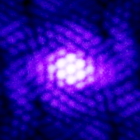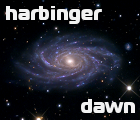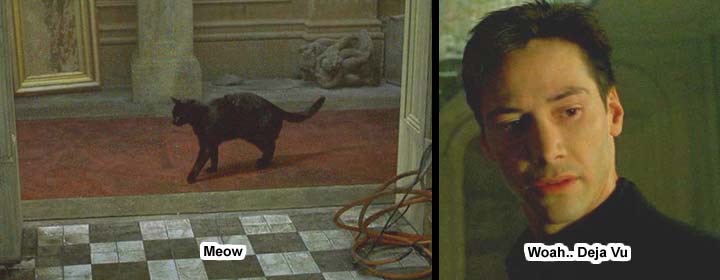|
Is the universe a simulation?
|
|
| DoctorOfSpace | Date: Tuesday, 25.06.2013, 10:02 | Message # 46 |
 Galaxy Architect
Group: Global Moderators
 Pirate
Pirate
Messages: 3600
Status: Offline
| Quote (Watsisname) (there is a smallest meaningful unit of distance according to quantum mechanics)
http://en.wikipedia.org/wiki/Planck_length
Just for those who don't know, however I suspect most people here know.
Quote (Watsisname) but an abstract one
True but there is enough space between any objects regardless of distance that you could continually divide it for the rest of your life and never even come conceivably close to this length. For all intents and purposes the space is infinite as there would always be more for you to divide into.
Intel Core i7-5820K 4.2GHz 6-Core Processor
G.Skill Ripjaws V Series 32GB (4 x 8GB) DDR4-2400 Memory
EVGA GTX 980 Ti SC 6GB
|
| |
| |
| Watsisname | Date: Tuesday, 25.06.2013, 10:24 | Message # 47 |
 Galaxy Architect
Group: Global Moderators
 United States
United States
Messages: 2613
Status: Offline
| Yes, but it's not infinite, but merely a number too unimaginably big for our grasp. 
I get what you're saying though, that a simulation can theoretically be made such that a viewer would be unable to distinguish it from the universe that we know. Interestingly enough, it is arguments such as these, and the finite "resolution" of space in our universe, among other principles of physics, that lead to the notion of our universe possibly being a simulation. 
Space Engine as a universe simulator does have another other notable difference from the real universe, which is that it does not simulate the fundamental interactions (or it mimics them, such as in the case of gravity). The user observing the universe of Space Engine does not influence the environment, yet in the real universe they do, with said influence expanding outward at the speed of light.
In a hypothetical simulator where the user can interact with their surroundings in a manner akin to the 'real' universe, this would not only exponentially increase the computational requirement, but also demand data architecture that is no longer procedurally generated. And the size of the region for which this occurs would expand at the speed of light, or else there would be a discontinuity, which other observers in the simulation would theoretically be able to observe. This is one way in which this type of simulated universe could be distinguished from the 'real' one we occupy. But then again, someone who lived in this sort of simulated universe would observe these phenomenon and conclude that they were the natural laws by which his universe operated.
I need to stop thinking about this now, the topic is beginning to weird me out. 

|
| |
| |
| DoctorOfSpace | Date: Tuesday, 25.06.2013, 10:36 | Message # 48 |
 Galaxy Architect
Group: Global Moderators
 Pirate
Pirate
Messages: 3600
Status: Offline
| Quote (Watsisname) But then again, someone who lived in this sort of simulated universe would observe these phenomenon and conclude that they were the natural laws by which his universe operated.
Exactly. The beings who live within the simulation would regard glitches or bugs as natural laws within the universe meaning the things we perceive to be natural laws, like for example spooky action at a distance, could very well be a glitch within the programming.
Quote (Watsisname) In a hypothetical simulator where the user can interact with their surroundings in a manner akin to the 'real' universe
If you add in external users at the same time within the same world space then yes.
What if you make a closed system that can be watched from the outside, but compute a single massive intelligence who is then broken into multiple beings from bacterium, to animals, human like intellects, and AI. The end result is just one being being computed and so it would only be capable of experiencing things one at a time within the system saving vast amounts of resources and no discontinuity would be perceivable.
It sounds impossible but in a computer simulation you can have an "infinite" amount of time and no time at all. From outside the simulation an hour could pass and inside the simulation an entire universe could be born and die. This means a single intelligence experiencing multiple lives would never know what it really was, could live trillions upon trillions of lives within the simulation one at a time, and the beings running the simulation would have access to all the data that one entity/program was able to gather.
Intel Core i7-5820K 4.2GHz 6-Core Processor
G.Skill Ripjaws V Series 32GB (4 x 8GB) DDR4-2400 Memory
EVGA GTX 980 Ti SC 6GB
|
| |
| |
| Watsisname | Date: Tuesday, 25.06.2013, 11:48 | Message # 49 |
 Galaxy Architect
Group: Global Moderators
 United States
United States
Messages: 2613
Status: Offline
| Quote (DoctorOfSpace) spooky action at a distance
[Tangential]I keep trying to think whether or not our universe would be habitable without quantum entanglement. It seems to me that all these crazy physical laws, entities, phenomenon, etc end up being at least indirectly responsible for our existence, but I don't know what the heck the relevance of entanglement could be. It does seem a totally weird thing.[/tangential]
Quote It sounds impossible but in a computer simulation you can have an "infinite" amount of time and no time at all.
Indeed! This even potentially leads to a solution to the problem of Heat Death in our universe.

|
| |
| |
| midtskogen | Date: Tuesday, 25.06.2013, 13:09 | Message # 50 |
 Star Engineer
Group: Users
 Norway
Norway
Messages: 1674
Status: Offline
| I don't think it's possible to reason about whether this universe is a simulation or not without knowledge or assumptions about the simulating universe. And it seems obvious that the universe can't perfectly simulate itself. The only meaningful question then becomes, if our universe is a simulation, what can be deduced about the simulating universe?
NIL DIFFICILE VOLENTI

|
| |
| |
| DoctorOfSpace | Date: Tuesday, 25.06.2013, 13:26 | Message # 51 |
 Galaxy Architect
Group: Global Moderators
 Pirate
Pirate
Messages: 3600
Status: Offline
| Quote (midtskogen) And it seems obvious that the universe can't perfectly simulate itself
This is impossible to know until enough is known about the universe where all that information could be fed into a simulation.
I suspect it is completely possible to simulate a universe once one knows the fundamental laws of reality.
Intel Core i7-5820K 4.2GHz 6-Core Processor
G.Skill Ripjaws V Series 32GB (4 x 8GB) DDR4-2400 Memory
EVGA GTX 980 Ti SC 6GB
|
| |
| |
| Voekoevaka | Date: Tuesday, 25.06.2013, 13:27 | Message # 52 |
 World Builder
Group: SE team
 France
France
Messages: 1016
Status: Offline
| It is possible that the universe is really a simulation, as everything that follow mathematical rules can be a simulation. But I think if the universe is a simulation, we will never proove it because we are part of the simulation. So, if the universe is a simulation or not, the result is the same, the two assertions are equivalent. So the question is meaningless.
Quote (midtskogen) And it seems obvious that the universe can't perfectly simulate itself.
I don't agree with this. In mathematics, we can define sets which belong to themselves. We don't know how exactly the universe works, but if the universe is fundamentally a mathematical object, it can simulate itself. But today, we don't know what give the structure of the universe. Quantum Physics just give a probability law for the properties af an object when it is observed. Is there a deterministic law behind that ?
Want some music of mine ? Please go here !

|
| |
| |
| DoctorOfSpace | Date: Tuesday, 25.06.2013, 13:38 | Message # 53 |
 Galaxy Architect
Group: Global Moderators
 Pirate
Pirate
Messages: 3600
Status: Offline
| Quote (Voekoevaka) So the question is meaningless.
The only issue I have with the universe being a simulation is long term survival. If we assume the multiverse is real and a universe can branch then humans, and any other intelligent species, have a shot at immortality by jumping to other universes before this one ends.
If we exist within a computer simulation then inevitably, even if the simulation is running near the speed of light, the simulation will end and our universe or simulated multiverse will be destroyed. Unless the civilization running the simulation move the simulation into other universes in their own multiverse.......

Intel Core i7-5820K 4.2GHz 6-Core Processor
G.Skill Ripjaws V Series 32GB (4 x 8GB) DDR4-2400 Memory
EVGA GTX 980 Ti SC 6GB
Edited by DoctorOfSpace - Tuesday, 25.06.2013, 13:39 |
| |
| |
| HarbingerDawn | Date: Tuesday, 25.06.2013, 13:41 | Message # 54 |
 Cosmic Curator
Group: Administrators
 United States
United States
Messages: 8717
Status: Offline
| Quote (DoctorOfSpace) regard glitches or bugs

Quote (DoctorOfSpace) a single massive intelligence who is then broken into multiple beings from bacterium, to animals, human like intellects, and AI. The end result is just one being being computed and so it would only be capable of experiencing things one at a time within the system saving vast amounts of resources and no discontinuity would be perceivable.
This is impossible, unless the entity being simulated did not encounter any other entities, since the behavior of each entity (at least after a certain rather early evolutionary stage) would depend on the behavior of the other entities around it. If you simulate one, you would have to simultaneously simulate the others with close to if not exactly the same fidelity.
Quote (midtskogen) The only meaningful question then becomes, if our universe is a simulation, what can be deduced about the simulating universe?
Little, if anything. If it operates by similar rules to our universe, then it would have to contain more information than ours. It is difficult to deduce more than that.
All forum users, please read this!
My SE mods and addons
Phenom II X6 1090T 3.2 GHz, 16 GB DDR3 RAM, GTX 970 3584 MB VRAM
|
| |
| |
| DoctorOfSpace | Date: Tuesday, 25.06.2013, 13:59 | Message # 55 |
 Galaxy Architect
Group: Global Moderators
 Pirate
Pirate
Messages: 3600
Status: Offline
| Quote (HarbingerDawn) unless the entity being simulated did not encounter any other entities, since the behavior of each entity (at least after a certain rather early evolutionary stage) would depend on the behavior of the other entities around it. If you simulate one, you would have to simultaneously simulate the others with close to if not exactly the same fidelity.
Or you think of the entity being the simulation itself. The best visualization I can think of would be a circle branched out and as its branching out its going to points, each point feeds back to the whole but from the points view it is a separate being. All points are the same entity experiencing different possibilities and lives at once.
This could quite possibly require simulating higher dimensional space allowing for "loops" in time in which the entity would be experiencing different lives at the same time. This is possible to some degree on todays computers by recording one point, then putting your character of now in the recorded space. It isn't too unlikely that a future computer system could actually simulate past/present/future and a being within this reality or built as part of the reality would be linked with all points in time in the simulation. The over all entity would be the information repository that the external civilization would read from.
Quote (HarbingerDawn) If it operates by similar rules to our universe, then it would have to contain more information than ours. It is difficult to deduce more than that.
Unless by having a theory of everything and plugging that data into a computer simulates an entire universe.
Intel Core i7-5820K 4.2GHz 6-Core Processor
G.Skill Ripjaws V Series 32GB (4 x 8GB) DDR4-2400 Memory
EVGA GTX 980 Ti SC 6GB
|
| |
| |
| midtskogen | Date: Tuesday, 25.06.2013, 14:11 | Message # 56 |
 Star Engineer
Group: Users
 Norway
Norway
Messages: 1674
Status: Offline
| Quote (Voekoevaka) It is possible that the universe is really a simulation, as everything that follow mathematical rules can be a simulation.
But we don't know that the universe fundamentally follows mathematical rules. That's just the assumption that we make in order to reason about it.
NIL DIFFICILE VOLENTI

|
| |
| |
| Voekoevaka | Date: Tuesday, 25.06.2013, 14:57 | Message # 57 |
 World Builder
Group: SE team
 France
France
Messages: 1016
Status: Offline
| Thay's why I just assume that as a possibility, and I didn't get further. I think we'll never have an answer for the question, as I think physics will never end.
Want some music of mine ? Please go here !

|
| |
| |
| Watsisname | Date: Tuesday, 25.06.2013, 20:06 | Message # 58 |
 Galaxy Architect
Group: Global Moderators
 United States
United States
Messages: 2613
Status: Offline
| Quote But we don't know that the universe fundamentally follows mathematical rules. That's just the assumption that we make in order to reason about it
Correct.
Mathematics is a language we use to describe how phenomenon in the universe operate, and it is exceedingly useful in this regard, but the universe may not be mathematical at heart.
The question of whether or not the universe is a simulation is an interesting one but it is also potentially untestable. One can't look for 'bugs' in the simulation because we would simply interpret these bugs as the normal laws of physics. Or if we found a bug, the simulation may fix it automatically. For all we know this has already happened many times. One possibly fruitful method would be to run a very large number of extremely computationally expensive simulations and look for signs of strain in the universe. But again, the server may be able to detect this and intervene, removing any inconsistencies without our ever being aware.
At the end of the day these become almost like religious questions, with no robust way to test them, no way at all to disprove them, and little in the way of meaningful knowledge gained either way. Why should we be concerned if the universe is indeed a simulation? It is still the universe we always knew; there's nothing 'fake' about it.
Quote If we exist within a computer simulation then inevitably, even if the simulation is running near the speed of light, the simulation will end and our universe or simulated multiverse will be destroyed.
I'm not sure why that follows; I can easily imagine a simulation with no end-state. Our universe also has no end-state, but only becomes increasingly entropic. We could escape Heat Death by uploading ourselves into our own simulated universe, and accordingly increase the time-step to counter the steadily decreasing available energy per unit volume. Nobody in the simulation would notice.

|
| |
| |
| DoctorOfSpace | Date: Tuesday, 25.06.2013, 20:17 | Message # 59 |
 Galaxy Architect
Group: Global Moderators
 Pirate
Pirate
Messages: 3600
Status: Offline
| Quote (Watsisname) Nobody in the simulation would notice.
Inevitably the energy keeping the simulation going would run out and the simulation would end.
Intel Core i7-5820K 4.2GHz 6-Core Processor
G.Skill Ripjaws V Series 32GB (4 x 8GB) DDR4-2400 Memory
EVGA GTX 980 Ti SC 6GB
|
| |
| |
| Watsisname | Date: Tuesday, 25.06.2013, 20:26 | Message # 60 |
 Galaxy Architect
Group: Global Moderators
 United States
United States
Messages: 2613
Status: Offline
| Incorrect. The energy available to do work never becomes zero, it only asymptotically approaches zero. That's what increasing the time step is for.
Edit: Actually I'm probably wrong. There's probably a lowest possible temperature that the universe can reach (lowest energy photon from the CMB) -- Quantum Mechanics ruins the day. And this idea goes totally out the window if a Big Rip occurs.

|
| |
| |